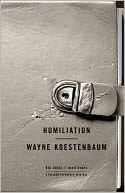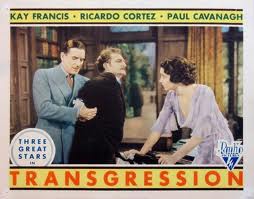In the beginning, there was humiliation. This is the ur-myth in the restive heart of Humiliation, Wayne Koestenbaum’s garrulous, sleeve-tugging, and beguiling long essay. Humiliation is not just his obsessive topic but also a point of departure, a space to pass through, a destination, and the fuel for the trip.
 “ ‘Humiliation’ means ‘to be made humble,’ “ he writes. “To be made human? ‘Human’ and ‘humiliation’ do not share an etymological root, but even in Latin the two words — humanus and humiliatio — suggestively share a prefix.” In a sense, his book is an extended suggestion, comprising notebook-like entries that both prick at conscience and pinch the cheek.
“ ‘Humiliation’ means ‘to be made humble,’ “ he writes. “To be made human? ‘Human’ and ‘humiliation’ do not share an etymological root, but even in Latin the two words — humanus and humiliatio — suggestively share a prefix.” In a sense, his book is an extended suggestion, comprising notebook-like entries that both prick at conscience and pinch the cheek.
By page 70 I had made note of several stabs at defining humiliation, starting with “an observable lowering of status and position.” But it is also “a process of accretion .. one grows more and more humiliated.” He says it “resembles a fold … the outer and inner realms change places … An object that should be private and unseen is suddenly visible.” He then describes humiliation “as the intrusion of an unwanted substance or action upon an undefended body. The pain of intrusion, but also its suddenness and incomprehensibility (what substance is entering me?) – constitutes the humiliation.”
 One soon understands that Koestenbaum, stunned by this incomprehensibility, is pacing around a subject that, from various vantage points, takes on different and often contradictory attributes. “Humiliation is worthy,” he decides, “not because it is good, or enjoyable, or desirable; humiliation may be execrable and unendurable, but it is also genuine … humiliation at least rings true.” (When allowing your body to be used with minimum intervention of your mind, small-mindedness and fakery are undermined. Or so I read his assertion. He says elsewhere, “Humiliation, within the masochistic economy, cancels a prior debt.”) In the next breath, he says, “Humiliation doesn’t actually happen; it is a cloud of inference and aftermath, a nonlocatable atmosphere of outrage and distress.”
One soon understands that Koestenbaum, stunned by this incomprehensibility, is pacing around a subject that, from various vantage points, takes on different and often contradictory attributes. “Humiliation is worthy,” he decides, “not because it is good, or enjoyable, or desirable; humiliation may be execrable and unendurable, but it is also genuine … humiliation at least rings true.” (When allowing your body to be used with minimum intervention of your mind, small-mindedness and fakery are undermined. Or so I read his assertion. He says elsewhere, “Humiliation, within the masochistic economy, cancels a prior debt.”) In the next breath, he says, “Humiliation doesn’t actually happen; it is a cloud of inference and aftermath, a nonlocatable atmosphere of outrage and distress.”
 What is it like to witness someone else’s humiliation? How is it possible to behave like Lynndie England at Abu Ghraib prison? Koestenbaum recalls that the punishments dealt to his siblings “made an imprint on me, turned me into a curious spectator, willing to shiver into life and identification at the sight of someone else’s ostracization … I burn and freeze at the same time.” The observer becomes humiliated by his observation. What happens when the writer turns his attention to a humiliated public persona such as Monica Lewinsky or Michael Jackson? Koestenbaum writes:
What is it like to witness someone else’s humiliation? How is it possible to behave like Lynndie England at Abu Ghraib prison? Koestenbaum recalls that the punishments dealt to his siblings “made an imprint on me, turned me into a curious spectator, willing to shiver into life and identification at the sight of someone else’s ostracization … I burn and freeze at the same time.” The observer becomes humiliated by his observation. What happens when the writer turns his attention to a humiliated public persona such as Monica Lewinsky or Michael Jackson? Koestenbaum writes:
“Did Michael Jackson’s father feel humiliated when Michael confessed to the media that he had been beaten as a child? Why am I trying to figure out who felt humiliated, as if this were a psychology experiment? Instead, I should argue for the worldwide eradication of humiliating situations. Writing, I occupy a humiliated position: the voice on trial. When someone speaks, or writes, that person’s voice is held captive by the laws of language, and by the demands of the listener. No wonder that some voices in history have exiled themselves from these expectations, even if it meant that the voice stepped over the edge into incomprehensibility, stink, mud, madness.”
 Humiliation begins as a book about humiliation. But soon, humiliation is what happens as one continues. This is a book that wants to penetrate our own “undefended bodies” — and succeeds by humiliating itself, insofar as it believes its own theorem: “to study a subject is to humiliate the subject and to humiliate oneself by the process of studying it.” The inadequacy of words is humiliating to the writer. Koestenbaum insists that we take note of his “preposterousness … which I hope you will forgive, and which I invite you to see as an echo of your own foolishness.” Such disarming gestures, of course, have a sly purpose. By failing to find a meaning in the pervasive fact of humiliation, we get to feel humiliated — and become his accomplices. “You have a right to wonder why I’m drawn to report such details to you,” he says, as if our right is in question, “a right to wonder why humiliation is worth contemplating, worth discussing — a right to wonder whether, instead of expatiating on its features, we should simply run away from it, silently.” But that’s not going to happen.
Humiliation begins as a book about humiliation. But soon, humiliation is what happens as one continues. This is a book that wants to penetrate our own “undefended bodies” — and succeeds by humiliating itself, insofar as it believes its own theorem: “to study a subject is to humiliate the subject and to humiliate oneself by the process of studying it.” The inadequacy of words is humiliating to the writer. Koestenbaum insists that we take note of his “preposterousness … which I hope you will forgive, and which I invite you to see as an echo of your own foolishness.” Such disarming gestures, of course, have a sly purpose. By failing to find a meaning in the pervasive fact of humiliation, we get to feel humiliated — and become his accomplices. “You have a right to wonder why I’m drawn to report such details to you,” he says, as if our right is in question, “a right to wonder why humiliation is worth contemplating, worth discussing — a right to wonder whether, instead of expatiating on its features, we should simply run away from it, silently.” But that’s not going to happen.
The omnipresence of humiliation would seem to indict, embrace, and forgive us all. Humiliation is larded with necessary equivocations, since we are both avid observers of humiliation and advocates for its banishment. Nevertheless, Koestenbaum insists that he has a specific reason for writing this book. He says, “The reason I’m writing is to silence the deep sea-well of my humiliated prehistory, a prologue no more unsettling than yours.” But silence hardly seems his goal. Some pages later he claims, “If this book has an ulterior aim, however disreputable, here it is: I want to stand up for those who are publically shamed for sexual conduct.” But sexual transgression, while confessed to and illustrated (with some muffled glee), doesn’t call out for defense. (There is some conflation throughout of humiliation, shame, and embarrassment.) Eleven pages later (page 101), he tosses up yet another but more convincing purpose for his book: “That is my goal: to reach the point of happy anesthesia, of indifference, where humiliation loses its foulness, or finds in its foulness a new, cocktail-bright divinity.”
 To achieve satiety, Koestenbaum recites a litany of 74 humiliations from his personal collection. Quickly, they lose their ability to provoke: happy anesthesia. They seem familiar. “That is the price of writing this book,” he says. “I need to incriminate myself, to establish my bona fides as a humiliation expert.” If he seems eager to pay the invoice, he is also dishing out payback. He writes, “If I use fancy language, if I depend on metaphors and complicated sentences, if I aestheticize any crud that crosses my path, if I behave antisocially, if I speak in unpopular and confusing ways, if I have sex in public restrooms, if I write, whenever possible, about having sex in public restrooms, if I repeatedly bring up ‘manure ponds’ for the weird pleasure of saying ‘manure ponds,’ that is because I want to reject the world that has humiliated me, and because I ineluctably (and gleefully) rush into humiliating situations with the faith that abreaction is always possible.”
To achieve satiety, Koestenbaum recites a litany of 74 humiliations from his personal collection. Quickly, they lose their ability to provoke: happy anesthesia. They seem familiar. “That is the price of writing this book,” he says. “I need to incriminate myself, to establish my bona fides as a humiliation expert.” If he seems eager to pay the invoice, he is also dishing out payback. He writes, “If I use fancy language, if I depend on metaphors and complicated sentences, if I aestheticize any crud that crosses my path, if I behave antisocially, if I speak in unpopular and confusing ways, if I have sex in public restrooms, if I write, whenever possible, about having sex in public restrooms, if I repeatedly bring up ‘manure ponds’ for the weird pleasure of saying ‘manure ponds,’ that is because I want to reject the world that has humiliated me, and because I ineluctably (and gleefully) rush into humiliating situations with the faith that abreaction is always possible.”
 Like Koestenbaum, I couldn’t bear to watch very much of Michael Haneke’s movie Funny Games — but was willing to witness Liza Minelli babbling in a televised interview with Larry King (which Koestenbaum sees as “a necessary, corrective aggressive against the entire system of performance”). Koestenbaum plunges into his subject while foreseeing that his readership “will shun and humiliate me.” But we don’t. The writing is too allusively sparkling, smart and often comical – especially when he extends his subject into the flow of daily experience. The book is filled with brilliant passages like this:
Like Koestenbaum, I couldn’t bear to watch very much of Michael Haneke’s movie Funny Games — but was willing to witness Liza Minelli babbling in a televised interview with Larry King (which Koestenbaum sees as “a necessary, corrective aggressive against the entire system of performance”). Koestenbaum plunges into his subject while foreseeing that his readership “will shun and humiliate me.” But we don’t. The writing is too allusively sparkling, smart and often comical – especially when he extends his subject into the flow of daily experience. The book is filled with brilliant passages like this:
“Think of the silent adjustments, and the subliminal toll they take on our equanimity, that we must make merely to understand how to behave in front of other people. And think of the humiliation undergone if these silent adjustments are not made. Think of the person who suddenly realizes that he or she may soon be incapable of undergoing the hard work involved in making silent adjustments to standard, consensual idioms of speech and behavior.”
 This is what he means when stating, “Intimacy with humiliation is part of our corporeal inheritance.” Ultimately, we may believe Koestenbaum when he proclaims yet another and perhaps penultimate goal: “I have a noble aim: to urge you to be kind when you see someone humiliated, even if you think the shamed person deserves punishment.”
This is what he means when stating, “Intimacy with humiliation is part of our corporeal inheritance.” Ultimately, we may believe Koestenbaum when he proclaims yet another and perhaps penultimate goal: “I have a noble aim: to urge you to be kind when you see someone humiliated, even if you think the shamed person deserves punishment.”
[Published by Picador Books on August 2, 2011. 192 pages, $14.00 paperback original. Issued in Picador’s “Big Ideas/Small Books” series.]
Watch Wayne Koestenbaum talk about embarrassing emails by clicking here.
So Glad to See This
You simply can’t read this book without being immersed in the fears, outrage, pleasures and finally freedoms that come from confronting Humiliation. And you have to give Wayne K credit for the insight, nerve and humor to put Humiliation in the center of the universe. Viva Humiliation!